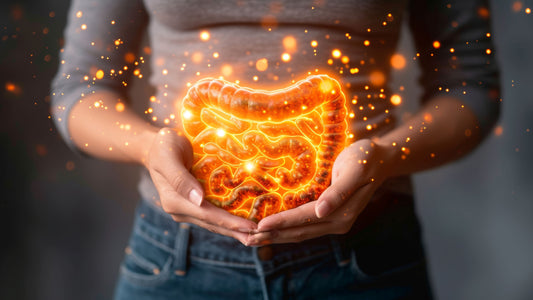You’re feeling tired. You’re having hot flashes. Your hair’s falling out in the shower. Is it menopause, or is it your thyroid? Or is it both? The hormonal changes that rock your entire body during perimenopause and menopause can mimic thyroid symptoms and vice versa. And menopause, with its drop in crucial hormones can wreak havoc on your thyroid — whether you already have hypothyroidism or if you’ve never had thyroid problems before. The truth is, that issues with your thyroid and menopause share a complex connection that can have a major impact on your health and well-being.
Let’s take a look at that connection and determine if menopause is making your thyroid issues worse or possibly masking thyroid problems.
Most importantly, we’ll talk about how to support your thyroid health during perimenopause,
menopause, and beyond.

Women are 5-8 times more likely than men to develop thyroid disorders, and it’s estimated that 1 in 8 women will struggle with their thyroid at some point in life. (1)
The most common form of thyroid dysfunction is hypothyroidism. Which is when your thyroid isn’t producing enough thyroid hormone. Hypothyroidism is most commonly caused by Hashimioto’s hypothyroidism, an autoimmune disease. (2)
Hypothyroidism And Menopause
Your thyroid gland produces hormones and helps regulate your metabolism. It plays a role in several important systems in your body, from your heart to your bones and brain. To say it is crucial for your hormone health is a massive understatement.
As you enter midlife, your sex hormone production starts to drop off, and this affects the delicate balance between your hypothalamus, pituitary, and thyroid — sometimes referred to as the HPT axis. (3)
This is probably why research suggests a relationship between menopause and changes in your thyroid. (4,5) And likely why the prevalence of hypothyroidism (underactive thyroid) tends to rise with age, particularly around the time of menopause. (6,7) It also appears that lower thyroid function is associated with osteoporosis and fractures in post-menopausal women. (8)
Hormone Imbalance, Progesterone, And Thyroid
During menopause, we often talk about how estrogen is declining.
But usually, your progesterone is declining at a more rapid pace than your estrogen.
And that can lead to what we call estrogen dominance , where your estrogen is left unchecked by progesterone. Estrogen dominance causes a whole host of uncomfortable problems, but let’s talk about your thyroid and estrogen dominance.
You see, estrogen suppresses thyroid hormone and progesterone stimulates it. So too much estrogen and not enough progesterone is a recipe for hypothyroidism.
Progesterone helps your body convert thyroid hormones — thyroxine (T4) to triiodothyronine (T3) more efficiently. T3 is the more active form of thyroid hormone. So when you don’t have enough progesterone, your thyroid function lags.
Furthermore, when estrogen is dominant (higher than your progesterone), this can promote the production of thyroid-binding globulin (TBG), a protein that binds thyroid hormones, making them less available to the body. Essentially, even if the thyroid is producing hormones at a normal rate, an excess of TBG keeps these hormones tied up and inactive, leading to symptoms of hypothyroidism. This is why you’ll often see thyroid hormone levels that look adequate when thyroid symptoms are present.
Low progesterone exacerbates the situation by failing to provide adequate support for thyroid hormone conversion. Not only does this imbalance favor estrogen dominance, but it also removes a key layer of support for thyroid hormone action within the body. The result is a double whammy where thyroid hormones are both less produced (due to increased TBG from estrogen dominance) and less effective (due to lack of progesterone support).
In this hormonal tug-of-war, the thyroid often ends up underperforming, which could lead to hypothyroidism.

As you can see, many of the signs of thyroid issues in women often look very similar to the signs of menopause. This is one of the reasons so many perimenopausal and menopausal women with hypothyroidism go undiagnosed.
Hypothyroidism And Hot Flashes
Another place hypothyroidism and menopause collide?
They both can cause hot flashes. While hypothyroidism hot flashes and night sweats are not the most common symptoms of Hashimoto’s, research suggests a relationship between thyroid health and menopause symptoms, including hot flashes. (10)
Diagnosing Hypothyroidism
When your thyroid’s not functioning properly, it’s important to address the issue. Because as I said earlier, problems with your thyroid lead to problems throughout your entire body — including your bones and heart!
The problem I often see is that women often struggle for years with vague thyroid symptoms like fatigue, low mood, and brain fog before they’re able to convince their doctor to run tests. Or their doctor only runs a cursory thyroid panel which doesn’t give an accurate picture of what’s happening to your thyroid.
Then, the ‘normal’ ranges for many of these labs are woefully inaccurate, leaving women in a limbo state of subclinical hypothyroidism.
This approach means you don’t discover that your thyroid is compromised until a significant portion of it has been damaged by Hashimoto’s. Not a great strategy if you ask me.
If you suspect you have thyroid issues, please try to find a doctor who will listen to you and order a complete, comprehensive thyroid panel > or order one yourself here.
Thyroid Support For Women
The great news is that it appears when you treat your thyroid disorder, it can help lessen your menopause struggles. (11)
And, when you’re able to increase progesterone, you can increase your thyroid hormone levels. In fact, one study saw women who supplemented with progesterone increase their FreeT4. (12)
It’s extremely important to note here: you need thyroid hormone to live. So if you are prescribed thyroid medication, it’s not optional. You can always support your thyroid function with proper nutrition and lifestyle interventions, but you’ve got to take your thyroid medicine if your doctor has prescribed it to you.
Let’s take a look at some supplements for low thyroid and talk about how to support progesterone to encourage hormone balance and ultimately dial in your thyroid function.
Hormone Support and Vitamins For The Thyroid
Your thyroid needs a wide variety of minerals and vitamins to function properly. One of the most important things you can do to help your thyroid is to eat a healthy, well-rounded diet full of nutrients.
Here are some of my favorite ways to make sure your thyroid is getting everything it needs to feel its best, especially when you’re a perimenopausal or menopausal woman.
At the top of my list of thyroid health supplements is bioidentical progesterone. Like we’ve discussed, progesterone is critical to supporting your thyroid and making sure your body can oppose estrogen — because estrogen suppresses thyroid hormone and progesterone stimulates it.
My favorite bioidentical progesterone is my Balance formula , a special blend of skin-loving, anti-aging ingredients, and progesterone that’s exactly the same as what your body makes, down to the very last molecule.
A list of thyroid supplementation recommendations wouldn’t be complete without mentioning the importance of inflammation support.
Since Hashimoto’s is an autoimmune condition, inflammation is often a factor. And, animal studies indicate Omega 3 supplementation can help regulate thyroid function. (13)
Omega 3 is my secret weapon when it comes to supporting healthy levels of inflammation. This is the one I use and recommend.
It’s important to give your thyroid a variety of nutrients . These are the three at the top of my list:
Iodine: Your body needs iodine to make thyroid hormones, and for most of us, iodine isn’t a big part of our typical diet. It’s found in abundance in foods like seaweed.
I use my Mighty Maca blend to make sure I’m getting just the right amount of iodine (and tons of other key nutrients!) for thyroid support on a daily basis. Plus, the extra adrenal support this drink offers is ideal for helping your thyroid, too.
Selenium: Selenium is one of those key trace minerals on your thyroid’s list of must-haves. You can get roughly enough selenium from eating a couple of Brazil nuts daily.
Zinc: Zinc is one of the unsung heroes of thyroid and hormone health. I use and recommend my Bright & Beautiful formula which combines the perfect zinc and selenium ratio for thyroid support and thicker hair and nails.
Key Takeaways: Your Thyroid And Menopause
Ultimately, if you have an existing thyroid disorder, entering menopause can make things even more challenging. Your doctor may have to adjust your thyroid medication dose during this time.
And if you’re experiencing hypothyroid-related symptoms like fatigue, brain fog, weight gain, constipation, or hair loss, especially if you’re under the age of 35, be sure to investigate thyroid disorders with the help of your physician.
For the ultimate in thyroid support, especially during menopause, make sure you’re:
👉 Encouraging your progesterone levels
👉 Supporting healthy levels of inflammation
👉 Getting plenty of vitamins and minerals daily
And always, don’t forget to prioritize connection and joy to get plenty of that sweet oxytocin circulating in your body — because you are worth it!






